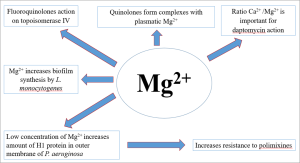Interactions of Antibacterial Antibiotics with Magnesium and Zinc
Main Article Content
Abstract
The action of antibacterial antibiotics on bacteria but also on the cells of the human body is dependent on many factors. An important place is the interactions with magnesium and zinc. The aim of this narrative review is to highlight the complexity of interactions between these two cations and some antibacterial antibiotics. The review presents pharmacokinetic, pharmacodynamic interactions and the influence of magnesium and zinc on some adverse effects of antibiotics. The influences of some antibiotics on plasma concentrations of magnesium and zinc are also discussed. The interactions take place before the contact of the antibiotic with the pathogenic bacteria, during the action on bacteria but also after this action. Some adverse effects of antibiotics are produced by their direct action on human cells and plasma and tissue concentrations of magnesium and zinc are important for reducing these effects. These two biometals play multiple and complex roles in the human body. Some antibiotics such as aminoglycosides and polymyxins greatly increase the renal excretion of magnesium and significantly decrease the plasma concentration of this cation. Zinc increases the bacterial sensitivity to the action of beta-lactams. The polymerization of vancomycin dimers increases the antibacterial activity and it is dependent of zinc. Zinc oxide nanoparticles have a significant antibiofilm action. On the other hand, magnesium and zinc salts greatly reduce the digestive absorption of many antibiotics and decrease their bioavailability. Regarding adverse effects, there are situations were magnesium and zinc can reduce some of these effects. A low magnesium level aggravates the cartilage damage produced by quinolones. This cation reduces nephrotoxicity of Aminoglycosides and vancomycin and hepatotoxicity of some antituberculosis drugs. Determination of zinc and magnesium concentration is strictly necessary for patients receiving antibiotics and in the case of abnormal levels, correction must be made immediately.
Article Details

This work is licensed under a Creative Commons Attribution 4.0 International License.
